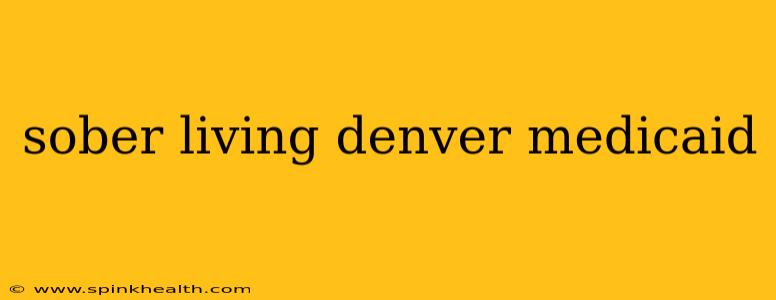The journey to sobriety is challenging, but finding the right support system can make all the difference. For those in Denver relying on Medicaid, accessing sober living resources might seem daunting. This guide unravels the complexities, offering insights and practical advice for individuals seeking affordable and effective sober living options within the Denver area while using Medicaid.
My name is Sarah, and I've spent the last decade working with individuals navigating the complexities of addiction recovery in Colorado. I've witnessed firsthand the challenges people face when trying to balance recovery with financial constraints. This article is born from that experience, aiming to provide a clear and helpful resource for those seeking help.
What is Sober Living?
Sober living, also known as a sober living home or halfway house, provides a supportive environment for individuals recovering from substance abuse. Unlike treatment centers, which offer intensive therapy and medical care, sober living houses focus on maintaining sobriety through structure, accountability, and peer support. Residents typically live together, sharing responsibilities and participating in community activities designed to promote healthy habits and sustained recovery.
Can Medicaid Cover Sober Living in Denver?
This is a frequently asked question, and the answer isn't a simple yes or no. Medicaid coverage for sober living in Denver, like in other states, varies significantly depending on several factors:
- Specific Medicaid Plan: Different Medicaid plans have different coverage policies. Some may directly cover a portion of sober living expenses, while others may not offer any coverage.
- Type of Sober Living Facility: Some facilities are better positioned to work with Medicaid than others. The level of care and services offered can impact eligibility. For example, a facility offering extensive clinical services might have different coverage options than a basic sober living home.
- Individual's Needs: The individual's specific needs and diagnosis will also play a role in determining eligibility. Medicaid may be more likely to cover sober living as part of a broader treatment plan that includes therapy and other medical interventions.
Therefore, it's crucial to contact your Medicaid provider directly to understand your specific coverage options. You should also inquire with potential sober living facilities about their policies on accepting Medicaid.
How to Find Medicaid-Approved Sober Living Homes in Denver?
Finding an appropriate sober living home that accepts Medicaid requires research and proactive engagement:
1. Contact Your Medicaid Case Manager:
Your case manager is your best resource. They can provide information on approved providers, navigate the application process, and assist in finding suitable facilities that align with your individual needs.
2. Search Online Directories:
Several online directories list treatment facilities and sober living homes, some of which may accept Medicaid. However, always verify coverage directly with the facility and your Medicaid provider. Don't rely solely on online information.
3. Reach Out to Local Organizations:
Many non-profit organizations and community centers in Denver offer resources and support for individuals seeking recovery. These organizations often have strong connections with local sober living homes and can guide you towards suitable options. They may also provide assistance with the Medicaid application process.
4. Inquire with Treatment Centers:
Many treatment centers in Denver offer step-down programs that transition clients to sober living. They can often recommend suitable facilities and may assist with the transition process.
What Services Do Sober Living Homes Usually Offer?
Sober living homes vary in the services they provide. However, many offer:
- Drug-free environment: A safe and supportive space free from substances.
- Structured daily routines: Schedules that promote consistency and healthy habits.
- House meetings: Opportunities for residents to share their experiences and support one another.
- Random drug and alcohol testing: Maintaining accountability.
- Curfews and other rules: Establishing boundaries and structure.
- Referral to outside resources: Connections to therapy, job training, and other vital services.
What if Medicaid Doesn't Cover My Chosen Sober Living Home?
If your preferred sober living home doesn't accept Medicaid, don't lose hope. Several other options exist:
- Explore Payment Plans: Many sober living homes offer flexible payment options.
- Seek Financial Assistance: Numerous organizations provide financial aid for addiction recovery.
- Consider a Shorter-Term Stay: Perhaps a shorter stay in a more expensive facility is feasible, followed by transition to a more affordable option.
The road to recovery is rarely straightforward, and navigating financial hurdles adds another layer of complexity. But remember, there are resources available. By being proactive, persistent, and persistent, you can find a path to recovery that aligns with your needs and financial situation. Don’t hesitate to reach out for help; you don’t have to go through this alone.

